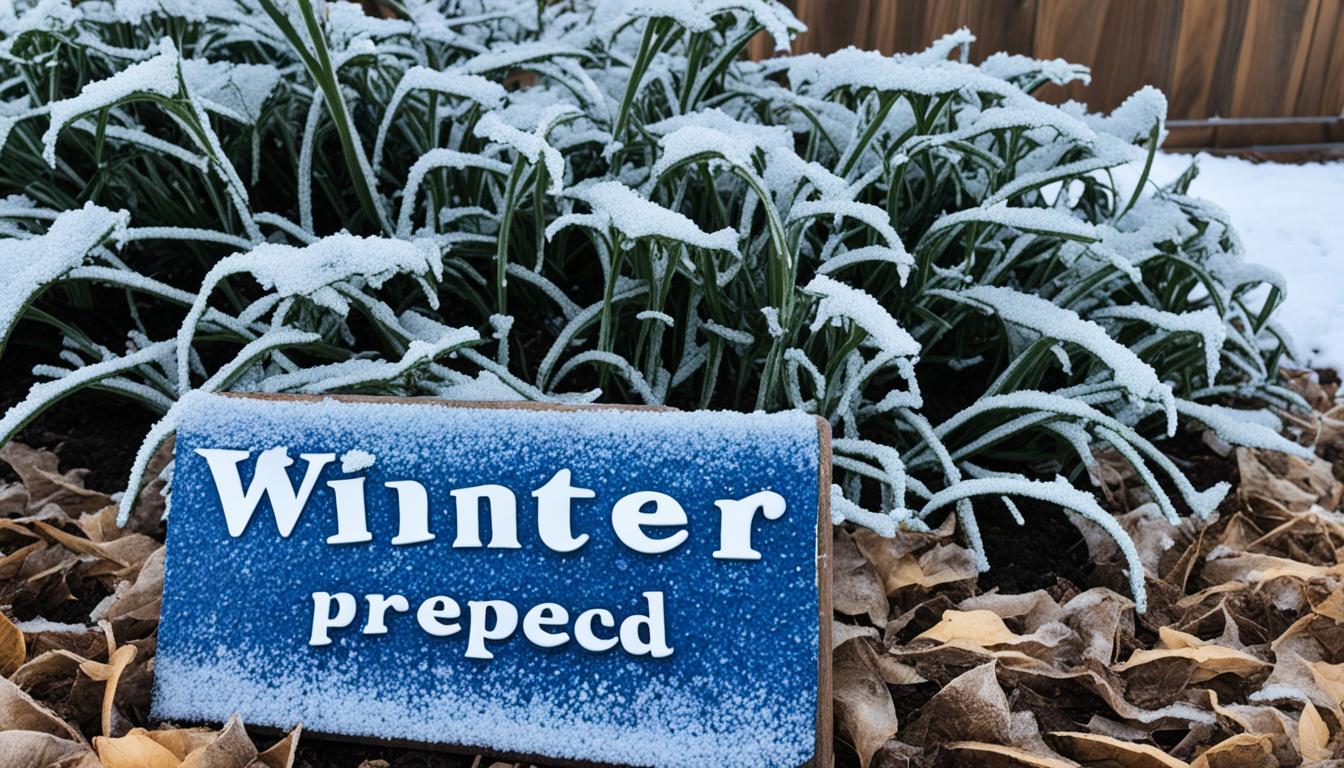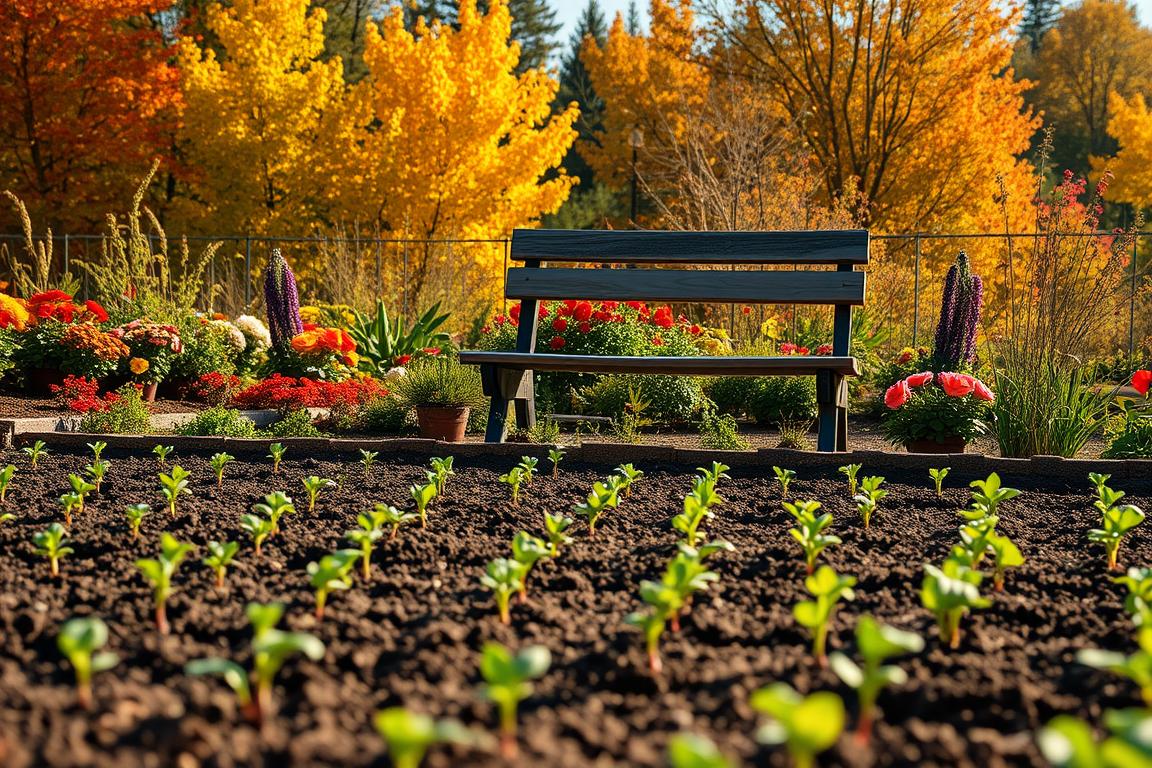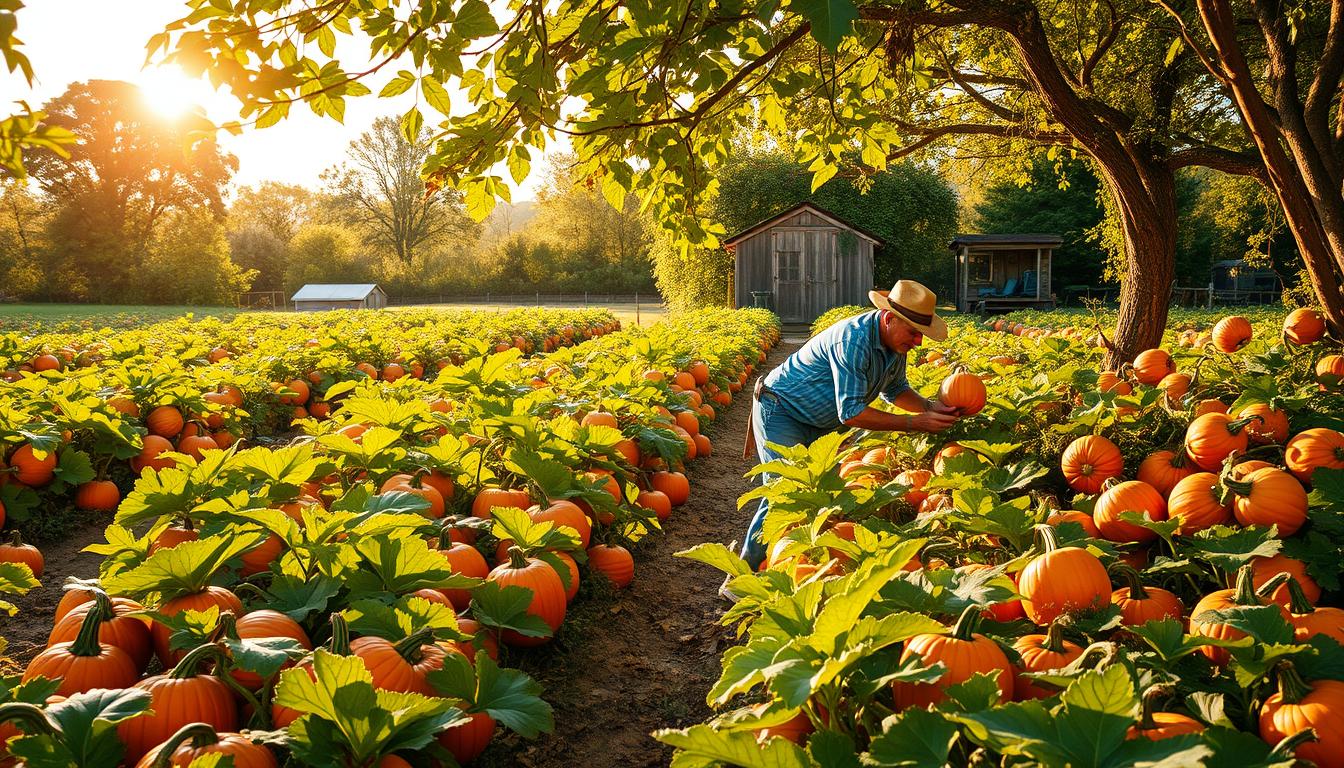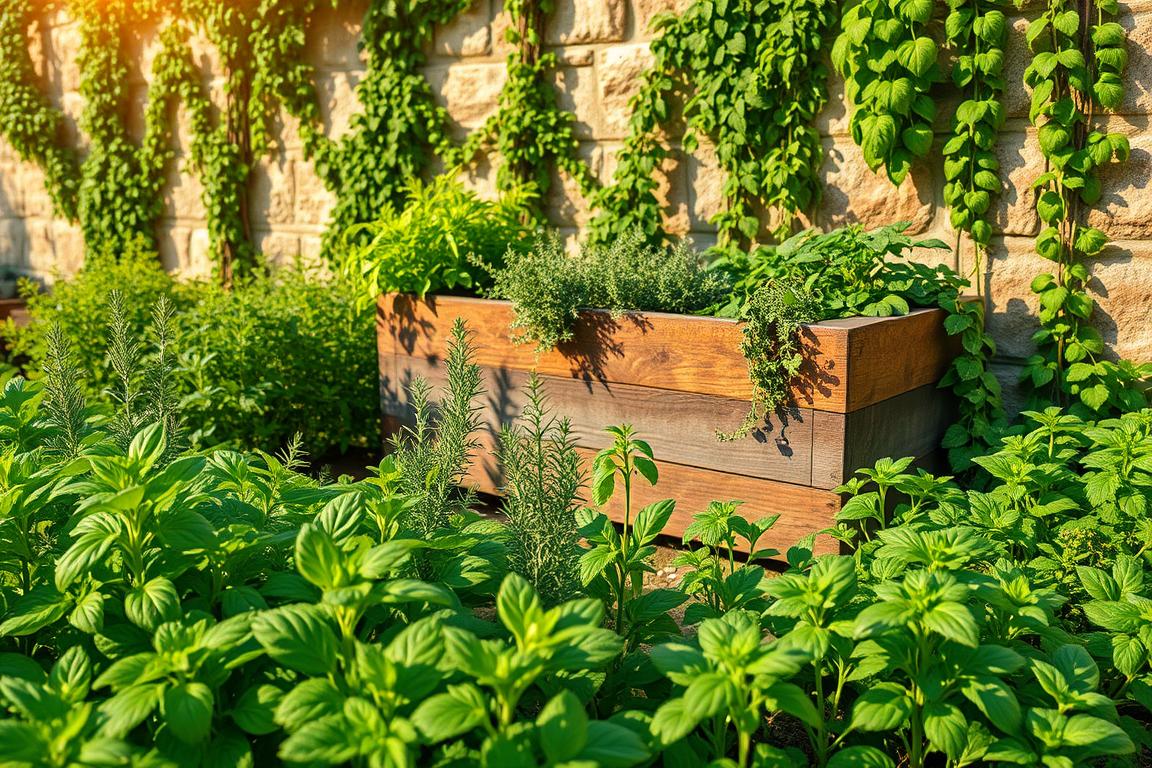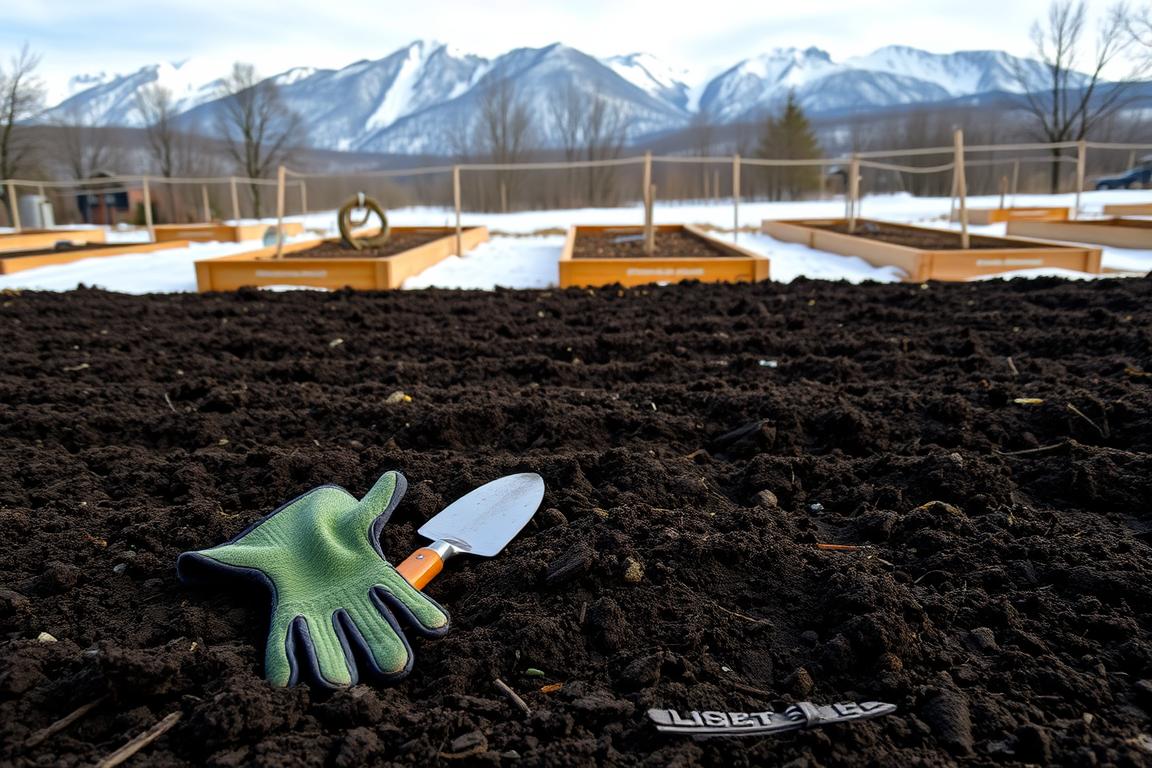As autumn’s chill arrives, gardeners must start getting their garden beds ready for winter. It’s key to winterize garden beds well to have a great spring and summer. Tasks include removing dead plants and weeds, protecting perennials, and taking care of berry patches and fruit trees.
Key Takeaways
- Removing spent plants and weeds from garden beds is essential for preventing pest and disease issues.
- Protecting perennial plants, including hardy greens and herbs, helps them survive the winter months.
- Applying a layer of winter mulch to garden beds insulates the soil and improves overall soil health.
- Properly caring for berry patches and fruit trees during the winter ensures a bountiful harvest the following year.
- Winterizing roses and other tender plants is crucial to prevent cold weather damage.
The Importance of Winter Preparation for Garden Beds
Getting your garden ready for winter is key to a great spring and summer garden. It helps your garden thrive in the next seasons. By winterizing your garden, you get many benefits that help later on.
Why Preparing Garden Beds for Winter is Crucial
Preparing your garden for winter means checking the soil’s condition. You can then add organic matter and nutrients. This makes your soil rich and ready for plant growth in warmer months.
Removing dead plants and weeds is also important. It stops pests and diseases from surviving the winter. This reduces the chance of problems in the future.
Protecting perennials and covering bare soil with mulch is vital. It keeps roots safe from freezing and retains soil moisture. This also stops weeds from growing, making your garden healthy in spring.
Looking after berry patches and fruit trees in winter is key. Pruning, mulching, and protecting them keeps them healthy and productive. This means more fruit for you and your family to enjoy.
Winterizing your garden has many benefits. It improves soil health and prevents pests and diseases. The work you do in fall and winter helps your garden when it’s time to grow again.
Removing Spent Plants and Weeds
As the gardening season ends, it’s key to remove spent plants and weeds from garden beds. This step stops pests and diseases from spreading next year.
Begin by pulling out dead annual plants like tomatoes, ground cherries, and tomatillos. Leaving this rotting plant matter can draw pests and spread diseases. Also, take out any annual flowers and other plants that have finished their life cycle.
Don’t forget to pull weeds from the garden beds too. Doing this before the ground freezes stops them from growing over winter. They won’t compete with next year’s plants for resources.
But, don’t remove everything right away. Perennial herbs like sage, chives, thyme, and oregano can stay and even be used in winter. Just make sure they are protected.
Clearing out spent plants and weeds sets the stage for a great growing season next year. This simple task is vital for stopping pests and diseases. It helps ensure a healthy and plentiful harvest in the future.
Protecting Perennial Plants
As winter comes, it’s key to protect your perennials, like hardy greens and herbs. These tough plants can make it through winter with some care. They can keep growing and providing food for you.
Overwintering Hardy Greens and Herbs
Herbs like sage, chives, thyme, and oregano can stay in the garden all winter. They can handle the cold and keep giving you fresh, tasty ingredients for cooking.
Hardy greens like kale can also be kept through winter with frost protection. This way, you can have homegrown greens even when it’s cold. It helps you keep eating fresh, nutritious food all year, extending the growing season.
Other perennials, such as Jerusalem artichokes and asparagus, can be covered with mulch. This keeps their roots warm and protects the cold-hardy plants from harsh weather. It helps them survive the winter.
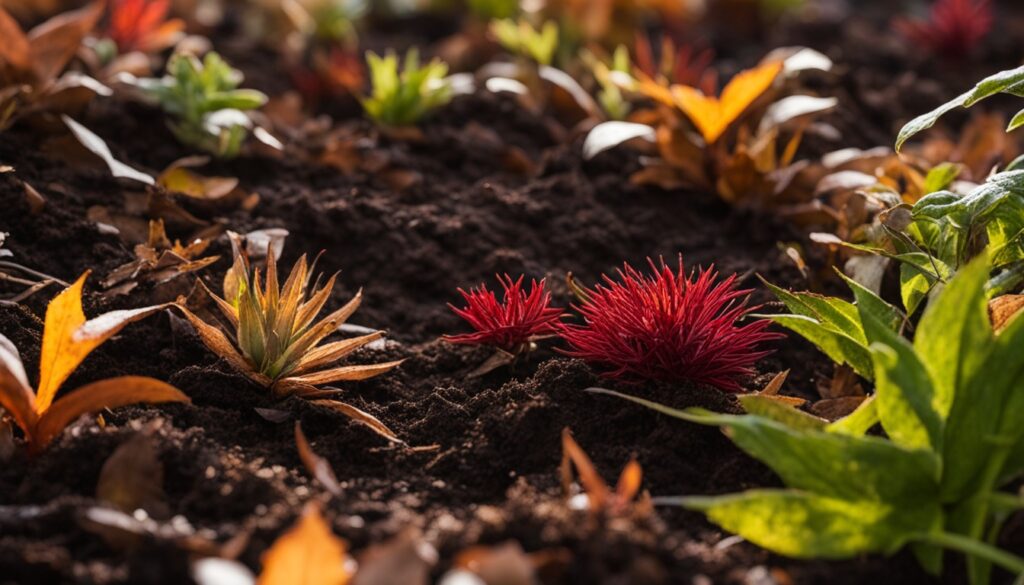
By looking after your perennials, you can enjoy the benefits of overwintering perennials. This means you get more from your garden, even in the cold months. It gives you a steady supply of fresh food and lets you use your garden fully.
Preparing Garden Beds for Winter
As summer ends, it’s time to get our garden beds ready for winter. This step is key for a great harvest next year and keeps your garden healthy. Let’s look at some important steps to prepare your garden for the cold season.
Amending soil in fall is vital. Adding compost or aged manure to the soil replenishes nutrients and improves its structure. This makes your plants healthier next year.
Cover cropping is another great way to boost soil health. Plants like winter rye or legumes fix nitrogen, stop weeds, and prevent erosion. They die back in spring, leaving behind organic matter to enrich the soil.
For a simpler method, using fall leaves as mulch is effective. Leaves break down and add nutrients and improve soil structure. You can leave them on the surface or mix them into the soil.
Covering bare soil with a tarp or mulch stops erosion and weeds. This is crucial in areas with lots of rain or strong winds.
Preparing your garden beds for winter sets the stage for a great growing season next year. With a bit of effort now, you’ll enjoy a healthier, more vibrant garden later.
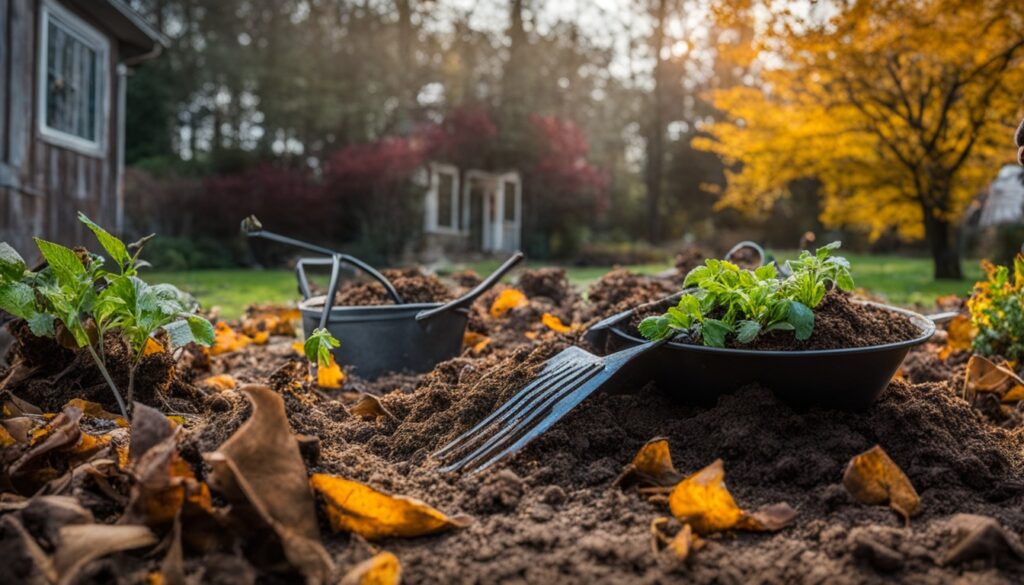
Caring for Berry Patches and Fruit Trees
As the gardening season ends, it’s crucial to care for your berry patches and fruit trees. This ensures a great harvest next year. Proper winter care protects them from harsh weather and helps them grow strong in spring.
For berry plants, pruning is crucial. In early to mid-fall, cut back summer-bearing raspberry canes to keep the strongest ones. Fall-bearing raspberries should have all canes cut to the ground. Blackberries do well when planted in the fall, so mound soil around the canes to stop them from moving.
Blueberries like a thin layer of mulch at their base for extra protection. Strawberries should have straw mulch over their beds.
Fruit trees need special care in winter too. Don’t prune them right before winter, as it can cause new growth that won’t harden off. Young trees might need their trunks wrapped to prevent winter damage. This helps keep them healthy and productive.
| Winterizing Berry Plants | Protecting Fruit Trees |
|---|---|
|
|
By following these tips for winterizing berry plants and protecting fruit trees, your berry patches and fruit trees will be ready for winter. They’ll be set to thrive in the next year.
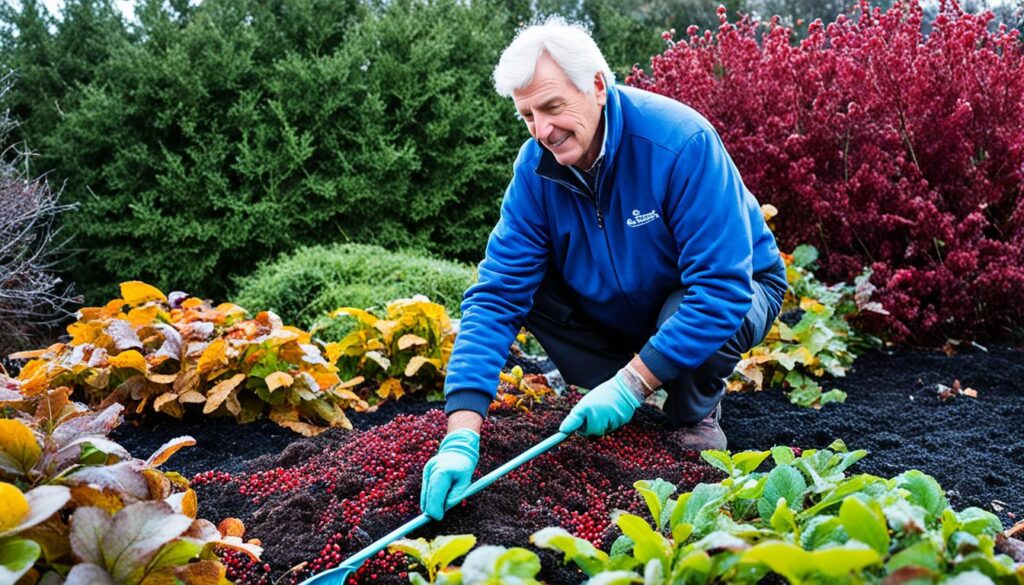
Preparing Perennials for Winter
As winter comes, gardeners need to focus on their perennials. Some perennials can stay as is, offering food and shelter for wildlife. But, others need extra care to make it through winter and bloom again in spring.
Cutting Back and Protecting Perennials
Plants like bee balm, phlox, and hostas should be cut back to stop diseases like powdery mildew. Wait for the ground to freeze and the leaves to dry before cutting. Leave about 3 inches of stem and cover with leaves or straw to keep the roots warm.
Tender perennials, like dahlias, gladioli, and cannas, should be dug up, dried, and stored in a cool, dry spot until spring. This keeps them safe from the cold and ensures they bloom well next year.
“Proper winterization is essential for the long-term health and vitality of your perennial garden.”
Preparing your perennials for winter helps them come back strong and colorful. This simple step is key for winterizing perennial flowers, preparing perennial beds, and overwintering tender perennials.
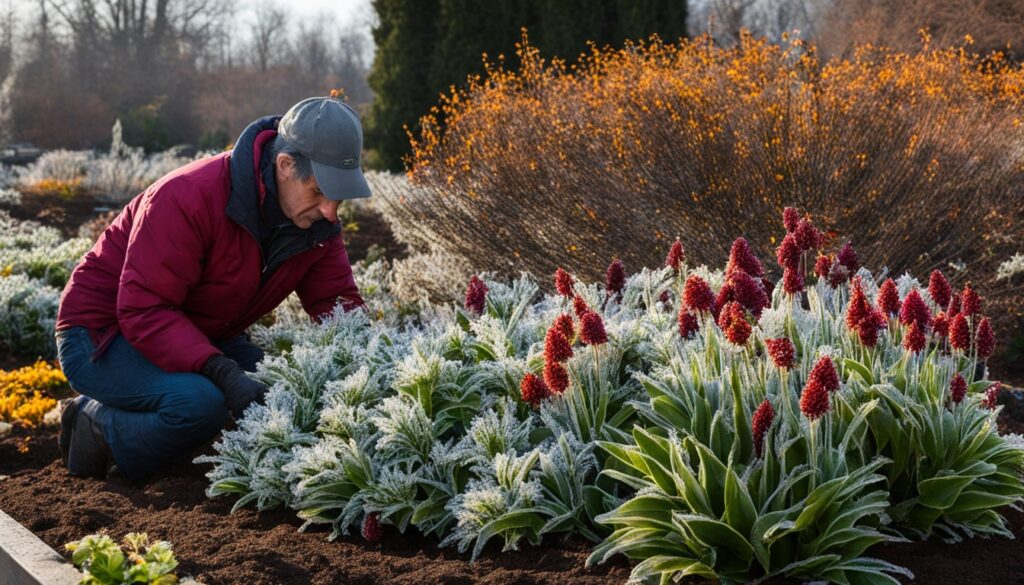
Winterizing Roses and Other Tender Plants
As winter comes, it’s key to get your garden ready. This means taking good care of roses and other delicate plants. Doing so helps them make it through the cold months.
Roses need extra love in the fall. Make sure they get watered, but don’t feed them six weeks before the first frost. Once it frosts, cover the rose canes with compost or leaves. If your winters are really cold, you might need to wrap the roses in a wire box and fill it with leaves or other materials to protect rose bushes for winter.
Climbing and tea roses should be laid down and covered with mulch or evergreen branches for overwintering tender plants. Young fruit trees and deciduous shrubs can also be wrapped or covered to keep them safe from heavy snow and extreme cold.
| Plant Type | Winterization Techniques |
|---|---|
| Roses |
|
| Climbing/Tea Roses |
|
| Young Fruit Trees, Deciduous Shrubs |
|
By spending time to winterize roses and other tender plants, you can help them survive the winter. This way, you’ll have a beautiful, healthy garden come spring.
Conclusion
Preparing garden beds for winter is key for gardeners who want a healthy garden next year. By removing spent plants and weeds, protecting perennial plants, improving the soil, and taking care of berry patches and fruit trees, gardeners boost soil health. This helps prevent pests and diseases and prepares the garden for a great growing season.
Winterizing garden beds takes some work in the fall, but it’s worth it. By getting the garden ready, gardeners make sure their plants are safe and ready to grow in spring. This preparation leads to a successful growing season and a rich harvest.
Take the chance to prepare your garden for winter and make the most of your outdoor space. With these important tips, you’re on your way to a garden that’s strong and full of life. It will give you a lot of beautiful and tasty plants.
FAQ
Q: What are the key steps in preparing garden beds for winter?
A: Key steps include removing dead plants and weeds. You should also protect perennials, amend the soil, and care for berry patches and fruit trees.
Q: Why is preparing garden beds for winter so important?
A: Winterizing your garden beds boosts soil health. It also helps prevent pests and diseases. This makes the next growing season more successful.
Q: How should I handle perennial plants in the garden during winter preparation?
A: Some perennials can stay in place, but others might need cutting back or protection. Tender perennials should be dug up, dried, and stored for spring.
Q: What special care do roses and other tender plants require for winter?
A: Roses and tender plants might need mulching, wrapping, or being enclosed. Young fruit trees can also be wrapped to protect them from cold and snow.
Q: How can I improve the soil in my garden beds before winter?
A: Add compost or aged manure, plant cover crops, or cover bare soil with fall leaves. These actions enrich the soil over winter.
Q: What steps should I take to care for berry patches and fruit trees in the fall?
A: Prune summer-bearing raspberry canes and plant blackberries. Mulch blueberry plants and cover strawberry beds. Don’t prune fruit trees just before winter.


